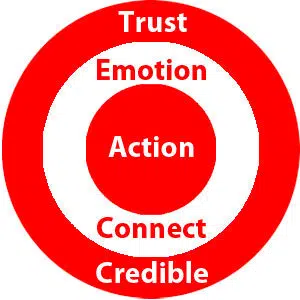How rhetoric can be effective at stirring passion, empathy and action in your customers

Rhetoric and PR: Trust and Credibility foster Emotion and Connections which ultimately lead to the desired Action
There are many arts within interpersonal communications that can benefit a publicist; however, the mastery of certain ones can be exceptionally advantageous. One of these arts is that of Rhetorical Theory. Rhetoric is probably one of the most demonized and misunderstood elements in interpersonal communication. It has largely been chalked up as a ploy reserved for politicians and lawyers. Rhetoric has become synonymous with the propaganda and trickery used by dishonest people to mislead the masses. This perception of rhetoric may be justified in certain situations or with certain individuals, but should most certainly not completely cloud rhetoric altogether; rhetoric should not be confused with propaganda. Rhetoric can be useful, mutually beneficial, and constructive.
Rhetoric is defined as the exchange of language to coordinate and induce social actions. Rhetoric thrives in moments of discontinuity and uncertainty. It is an integral part of human communication and — at its core — emphasizes freedom and equality in public dialogue. It is built on healthy dialogue and debate where all have a say. People use it every day, and an in-depth knowledge of rhetorical theory will give public relations practitioners insight into the art of persuasion.
AUDIENCE. The field of rhetoric teaches the importance of knowing the various publics at play in a given situation or public issue. As one engages in rhetorical situations, he or she must be mindful of who they are talking to and how he or she is perceived. A speaker must appeal to ethos, pathos, and logos when conveying a message. These aspects of rhetoric work to create a common ground and help guide the audience through the arguments and points of the speaker.
PATHOS. An appeal to pathos is an appeal to the emotions of people. One of the most effective ways to persuade people is to emotionally attach them to the situation and stir their passions. In a society that saturates people with the dryer arguments of intellect and logic, emotional appeals add a new dimension to persuasion; hence, they are more likely to invoke social action toward a desired direction. Pathos brings life to the conversation.
ETHOS. Another important side of human communication is the concept of credibility. When people are deciding what to believe or what course of action to take, the ethos, or authority, of the speaker will fall under heavy scrutiny. People need to be assured that the speaker is credible and strongly knows the topic of which he or she is speaking and possesses legitimate and honorable experience in the subject. If the speaker is credible, then an argument is more likely to be credible and valuable. When examining ethos, much comes into consideration; such as the background of a person, what the person stands for, how the speaker argues his points and so on. All of this judgment and the weight given to it makes ethos a huge part of persuasion.
Public relations at its very core functions to convince people to appreciate, buy into, or believe in a client’s purpose or objectives. In other words, the field of public relations relies on rhetoric to persuade the public to take specific courses of action. The fundamental concept of PR is to present a client as credible to the public. In turn, the public will be comfortable in engaging with the client. Special attention is paid to the target audience. In depth audience analyses are critical to successful communication with a client’s publics. Once a target audience is understood, it must be attached to the message. Through appeals to emotional elements of human life, or pathos, a connection can be made, and the audience can be driven to action, preferably in the client’s favor, if successful.
These are all concepts of rhetorical theory at play in the real world. Many people use them already without knowing it. However, if extra attention is devoted to honing rhetorical skills, publicists and marketers will improve their abilities to connect with people; and in an industry being built on cheap gimmicks, these professionals will shine.
